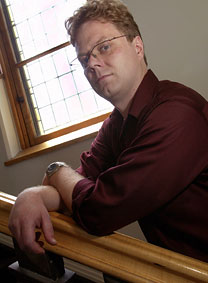Letting go is key to better aging

Carsten Wrosch says if people, especially older adults, redirect their goals, better mental health will likely follow.
Photo by Andrew Dobrowolskyj
Perseverance in the face of adversity is a noble trait, but is it good for your health? Carsten Wrosch wants to know.
The assistant professor of psychology will begin research this fall on how older adults can manage stress and well-being by adjusting their health goals.
A $224,514 grant from the Canadian Institute of Health Research will allow Wrosch and fellow researchers from the University of British Columbia and McGill University to track 240 older adults for three years. They’ll find out how an aging person’s own actions in the face of stress and pain can make a difference — and perhaps stave off the depression that so often afflicts seniors.
“We’re living in a time when more people than ever are living into old age. Aging is not always a healthy aging,” Wrosch said in an interview. “Older adults should be able to manage these things if they adjust their behaviour.”
At the base of most of his research is Wrosch’s curiosity about human adaptability. Much of his research revolves around aging, personality and quality of life. “What I’m trying to do is bring things together a little bit.” Currently he has three major research projects that touch on reassessing, and sometimes changing, goals.
Born in West Berlin, the 37-year-old professor earned his MA and doctorate in psychology from the Free University of Berlin. He worked at the Max Planck Institute for Human Development in Berlin before doing his postdoctoral work at Carnegie Mellon University in Pittsburgh. There he continued research on life regrets before moving to Concordia in August 2001.
In a study published last year, Wrosch and Jutta Heckhausen, a psychologist at the University of California in Irvine, reported that the way we look at our regrets can affect our mental well-being.
They questioned 122 people ranging in age from 20 to 87 years old. Younger adults tended to take responsibility for their regrets, saying they had control of the situation. However, older adults, faced with little time or ability to repair a situation, were inclined to cut themselves some slack and spread the blame.
The research intrigued Wrosch. He wondered how people dealt with situations in which they couldn’t reach their goals. Last year, he was awarded a $45,000 grant from Quebec’s Fonds de Recherche de sur la Société et la Culture to find out.
“There are situations where you really can’t reach your goal, where you have to let go — loss of a loved one, end of a relationship, an accident,” he said.
If older adults replace an unattainable goal with another, their emotional well-being increases, preliminary findings show. “The ability to adjust your goals can be powerful.”
The role of adjustment plays an important part in another area: family businesses. Research shows that only 30 per cent of family businesses survive past the first generation. Much of the problem lies with an entrepreneur’s willingness to simply let go.
“This may make it difficult for the son or daughter to take over,” Wrosch said.
With a $97,000 federal grant from the Social Sciences and Humanities Research, Wrosch, along with management professor Marylène Gagné, plan to study the psychological factors of older business owners giving up control, and how their younger children handle the change.
“There may be something good about being able to let go,” Wrosch said. “Over time, people adjust.”